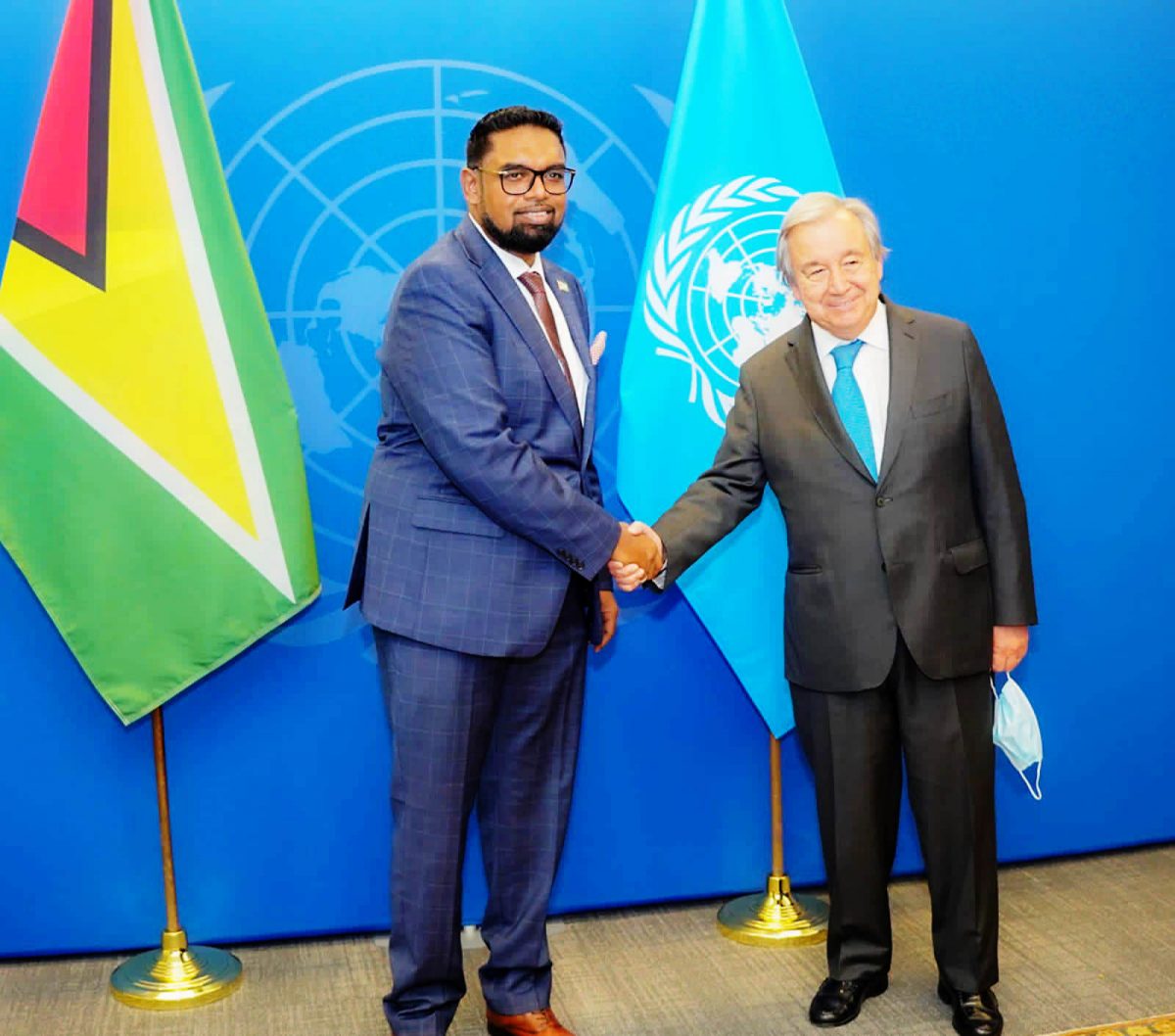Guyana will remain steadfast in its commitment to achieving a judicial settlement to resolve the ongoing border controversy with Venezuela, President Irfaan Ali told his global counterparts during his address to the United Nations General Assembly on Wednesday afternoon.
The President said that as part of the global family, Guyana subscribes to a rule-based international order as well as the need for a resurgence of political will and commitment to protect the multilateral architecture.
Ali said that Guyana does not condone or support the threat of or use of force in relations between states as a resolution of disputes. Consistent with the Charter of the United Nations, he added, Guyana subscribes to the use of peaceful means to settle disputes.
“In the matter of Guyana’s sovereignty and territorial integrity, challenged and threatened by Venezuela, as it is, we remain…committed to making the most of every diplomatic tool for the specific settlement of disputes as set out in the Charter of the United Nations.
“In this case, judicial settlement, as determined by the [United Nations] Secretary General himself, the world nations can be assured that Guyana shall remain true to those peaceful processes and deny every effort to depart from them. The International Court of Justice has already affirmed its jurisdiction in the matter,” Ali told world leaders.
He added that the Guya-nese government remains “deeply concerned” about the number of persons living in conflict situations. He noted that the ongoing war in Ukraine is having terrible effects on the region and country.
In March 2018, Guyana filed its application with the International Court of Justice (ICJ) to confirm the validity and binding effect of the Arbitral Award of 1899 on the boundary between the two countries and the subsequent 1905 agreement. This followed the decision by UN Secretary-General Antonio Guterres to choose the ICJ as the next means of resolving the controversy which stems from Vene-zuela’s contention that the award was null and void.
In its Application before the ICJ, Guyana requested that the Court adjudge and declare that:
“(a) The 1899 Award is valid and binding upon Guyana and Venezuela, and the boundary established by that Award and the 1905 Agreement is valid and binding upon Guyana and Venezuela;
(b) Guyana enjoys full sovereignty over the territory between the Essequibo River and the boundary established by the 1899 Award and the 1905 Agreement, and Venezuela enjoys full sovereignty over the territory west of that boundary; Guyana and Venezuela are under an obligation to fully respect each other’s sovereignty and territorial integrity in accordance with the boundary established by the 1899 Award and the 1905 Agreement;
(c) Venezuela shall immediately withdraw from and cease its occupation of the eastern half of the Island of Ankoko, and each and every other territory which is recognized as Guyana’s sovereign territory in accordance with the 1899 Award and 1905 Agreement;
(d) Venezuela shall refrain from threatening or using force against any person and/or company licensed by Guyana or engaged in economic or commercial activity in Guyanese territory as determined by the 1899 Award and 1905 Agreement, or in any maritime areas appurtenant to such territory over which Guyana has sovereignty or exercises sovereign rights, and shall not interfere with any Guyanese or Guyanese-authorised activities in those areas;
(e) Venezuela is internationally responsible for violations of Guyana’s sovereignty and sovereign rights, and for all injuries suffered by Guyana as a consequence.”
Guyana’s recourse to the ICJ followed decades of stalemate in its border controversy with Venezuela. Venezuela is not participating in the process but took part in the case management process.
Venezuela had reiterated its historical position of non-recognition of the jurisdiction of the Court to hear the case and highlighted the validity of the 1966 Geneva Agreement to reach a practical and mutually satisfactory settlement for the parties, through friendly negotiations.
Despite the ruling by the ICJ that it had jurisdiction to hear the case, Venezuela has taken the position that there is no basis of jurisdiction for this case since it has never given its consent.
According to Venezuela, Guyana approaching the ICJ “damages the meaning, purpose and reason of the Geneva Agreement.” Further, according to Venezuela, the matter is being pursued with “unjustified haste” when the world is currently facing “the most serious pandemic in more than a century.”
In March of this year, Guyana submitted its Memorial on the Merits of its border controversy case against Venezuela – as required by the Court following its decision of 18 December 2020, confirming its jurisdiction to decide the merits of Guyana’s claims.
“Guyana seeks from the Court a decision that the Arbitral Award of 1899 determining the boundary is valid and binding upon Guyana and Venezuela, and that the boundary established by that Award and the 1905 Agreement demarcating it, is the lawful boundary between Guyana and Venezuela. The Court has agreed in its earlier decision that it has jurisdiction to do so. Guyana now looks to the Court’s judicial process and its settlement of the matter under the rule of law,” the Ministry of Foreign Affairs had said in a statement following the submission.
In June, Venezuela formally submitted its objection to the admissibility of Guyana’s case before the ICJ. While Guyana’s Foreign Affairs Ministry said that the move is aimed at delaying the outcome of the case, it welcomed the participation of Caracas.
“…by its action, the Venezuelan government now joins the judicial process which Guyana had always urged it to do- a step that Guyana welcomes, confident of the validity of its position on the merits of the case,” the Ministry had said in a statement.




